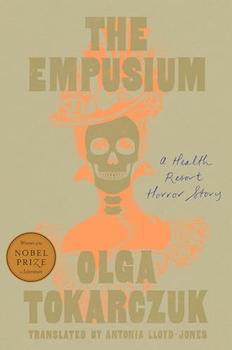Summary | Excerpt | Reviews | Beyond the book | Read-Alikes | Genres & Themes | Author Bio

A Health Resort Horror Story
by Olga TokarczukNot long after checking into Willi Opitz's "Guesthouse for Gentlemen," young Mieczysław Wojnicz walks into the dining room and finds the proprietor's wife spread out on the table, dead. Later that night, as he shares a meal with his fellow lodgers at the same table on which her body lay, he listens to them console the newly widowed husband. Women, they tell him, are of a fragile and sensitive nature—and thus more easily inclined to "ill-considered acts" like suicide. Consolation, however, is hardly necessary. Herr Opitz's more pressing concern is who will take over the cooking.
It's with such a grisly scene that Nobel Prize-winning author Olga Tokarczuk firmly sets the tone for her excellent new novel, The Empusium (translated by Antonia Lloyd-Jones). By turns dark, funny, shocking, and thought-provoking, this "health resort horror story"—as its subtitle describes it—presents a portrait of Old World Europe whose horror lies in its familiar New World prejudices. Set in the mountain town of Görbersdorf on the eve of the First World War, Tokarczuk's novel follows the timid, sickly Wojnicz as he "takes the waters" in an attempt to cure his tuberculosis. Finding the town's lavish Kurhaus (spa house) fully booked on his arrival, the young Pole ends up in Herr Opitz's guesthouse with the others waiting for admittance to more salubrious accommodation. In between their water cures, the men fight boredom by debating the great concerns of the day—communism, universal suffrage, racial inferiority and superiority—all while loosening their tongues with a mysterious liqueur called Schwämerei.
Of course, all is not as it seems in Görbersdorf. Rumor has it that Frau Opitz's suicide is not so out of the blue as initially thought; her husband's beatings surely drove her to it, or he simply did away with her himself. And it's not long before Wojnicz learns of other gruesome deaths, visited upon the town each November like clockwork. Not that the coming autumn spooks Herr Opitz's guests; their host always has a bottle of Schwämerei to hand, and it keeps them mollified. No one in the party can quite seem to remember how many seasons they've spent in Görbersdorf, but no one quite seems to care. The yearly killings are the stuff of folklore, and the men take to recounting stories of how, long ago, local women accused of witchcraft fled into the mountains—and some never came back, and their descendants live there still. Perhaps that explains the otherworldly noises Wojnicz begins to hear as he lies in his bed at night.
Like the body of Frau Opitz on the dining-room table, women are at the center of Tokarczuk's narrative without ever speaking a word. The Empusium features vanishingly few female characters, but their qualities and—more precisely—their defects are the obsession of the isolated male guests. As Wojnicz comes to realize, "every discussion, whether about democracy, the fifth dimension, the role of religion, socialism, Europe, or modern art, eventually led to women." If some of the misogyny on display acts as a reminder of how far gender equality has come in the last century, some comments nevertheless have a chilling modern resonance. Would it really be such a surprise today, at a time when reproductive rights find themselves once again litigated in the courts, to hear one guest's bold assertion that "a woman's body belongs not only to her, but to mankind"?
The Empusium offers a way out of this unforgiving worldview with the figure of sensitive, out-of-place Wojnicz. To say too much would spoil the twists of the novel's brilliant final third, but just as the spirits haunting the mountain forest call into question what is real and what is not, so too does the presence of this young student come to disprove the inflexible divisions—"black and white, day and night, up and down, man and woman"—by which the other male guests understand their world. While Tokarczuk's other characters can at times fall into caricature, her portrayal of Wojnicz's journey to self-realization consistently provides a devastating emotional weight to the novel, right up to its final gripping pages.
It can be tempting to view the Nobel Prize, which Tokarczuk won in 2018, as akin to other lifetime achievement honors: something with which to thank a writer while politely ushering them off the stage. Fortunately, it's clear that Tokarczuk has no plans to retire quietly. With its sinister setting, striking characters, and twisted, unexpected plot, The Empusium should ensure this Nobel winner remains an unmissable voice in contemporary fiction.
![]() This review
first ran in the October 2, 2024
issue of BookBrowse Recommends.
This review
first ran in the October 2, 2024
issue of BookBrowse Recommends.

If you liked The Empusium, try these:

by Nell Stevens
Published 2025
In a grand English country house in 1899, an aspiring art forger must unravel whether the man claiming to be her long-lost cousin is an impostor.

by Joan Lindsay
Published 2017
A 50th-anniversary edition of the landmark novel about three "gone girls" that inspired the acclaimed 1975 film and an upcoming TV series starring Natalie Dormer.
Your guide toexceptional books
BookBrowse seeks out and recommends the best in contemporary fiction and nonfiction—books that not only engage and entertain but also deepen our understanding of ourselves and the world around us.